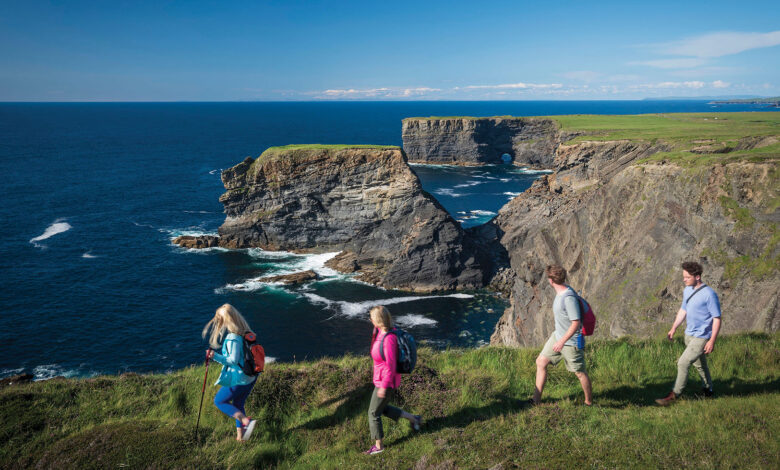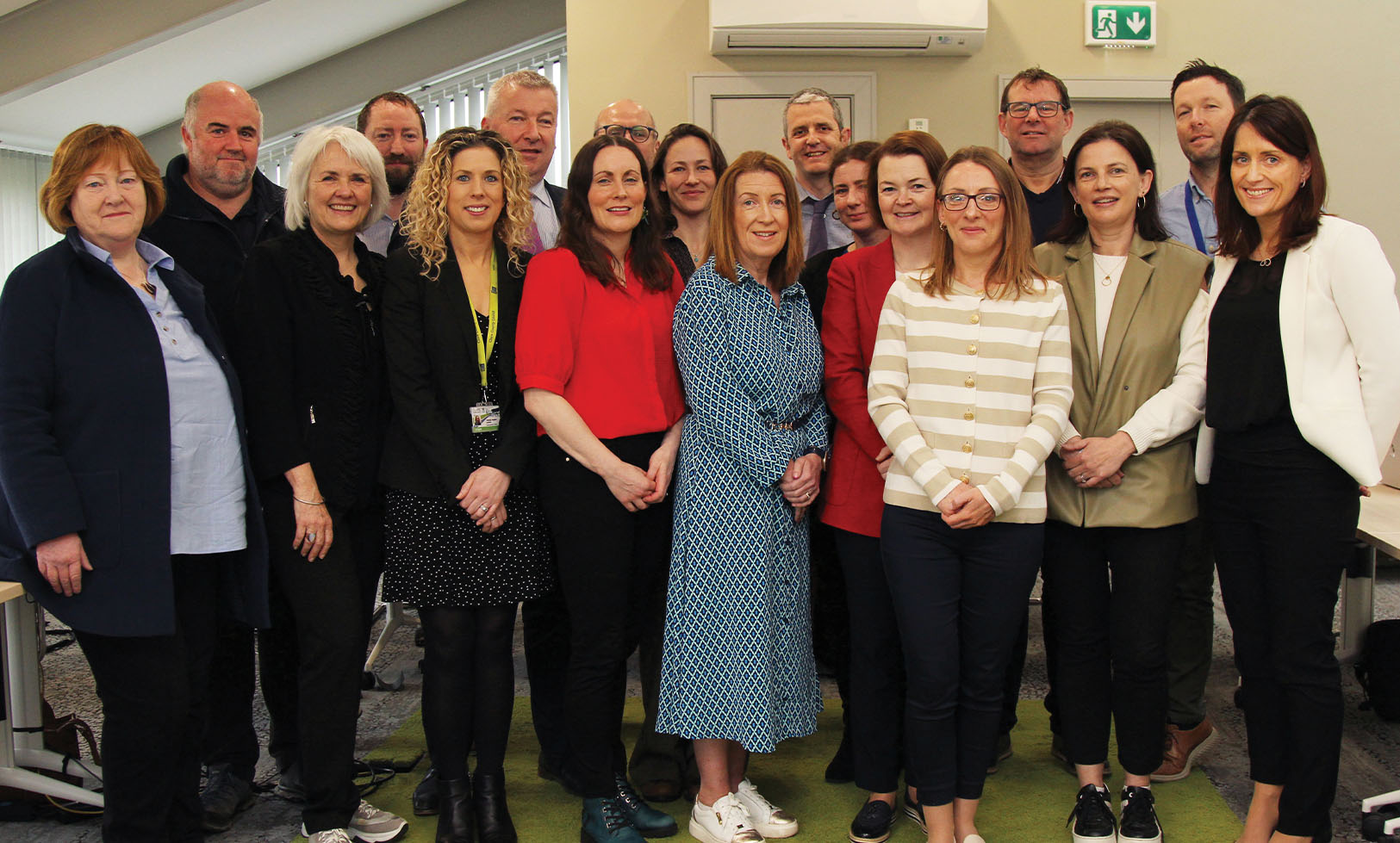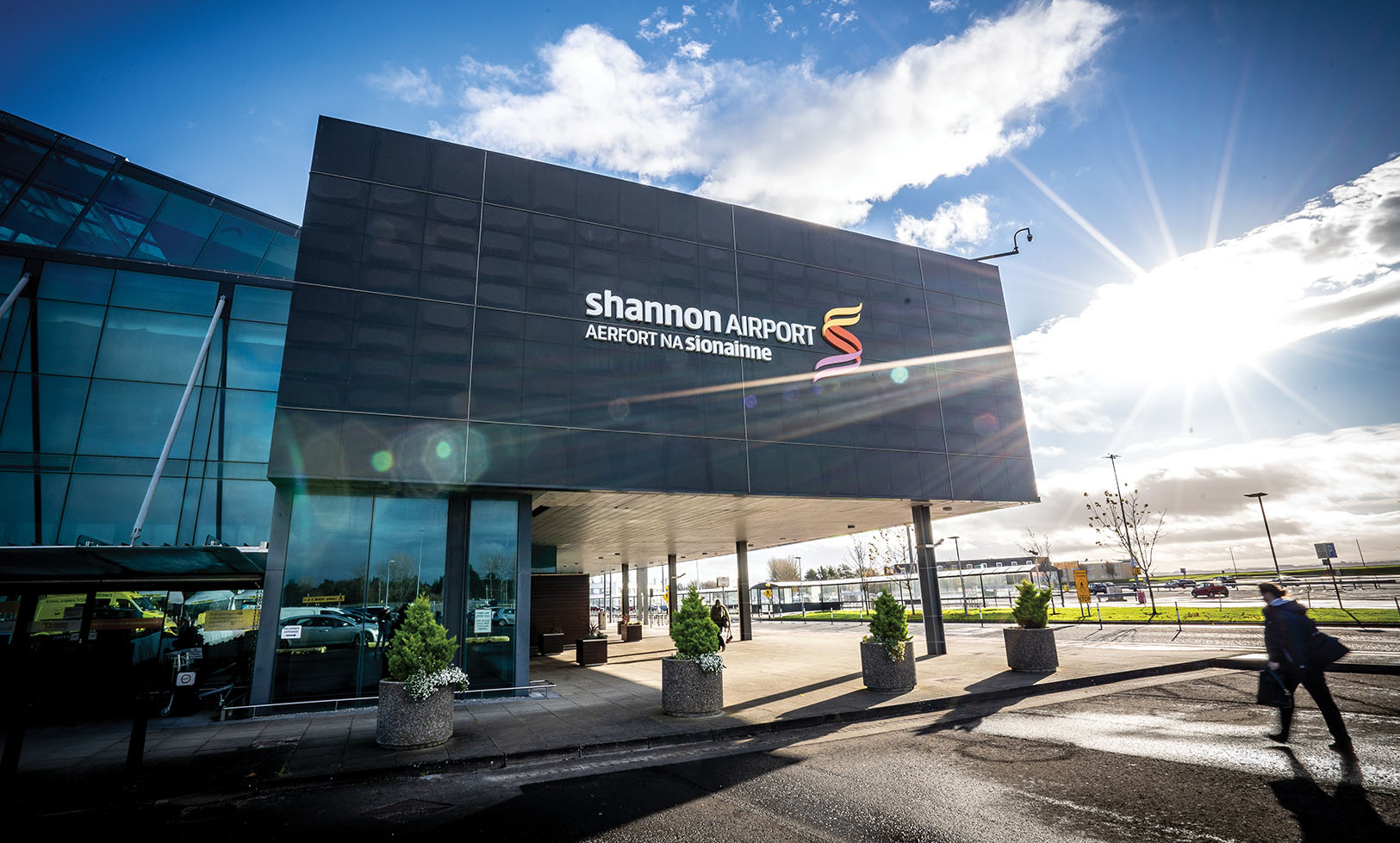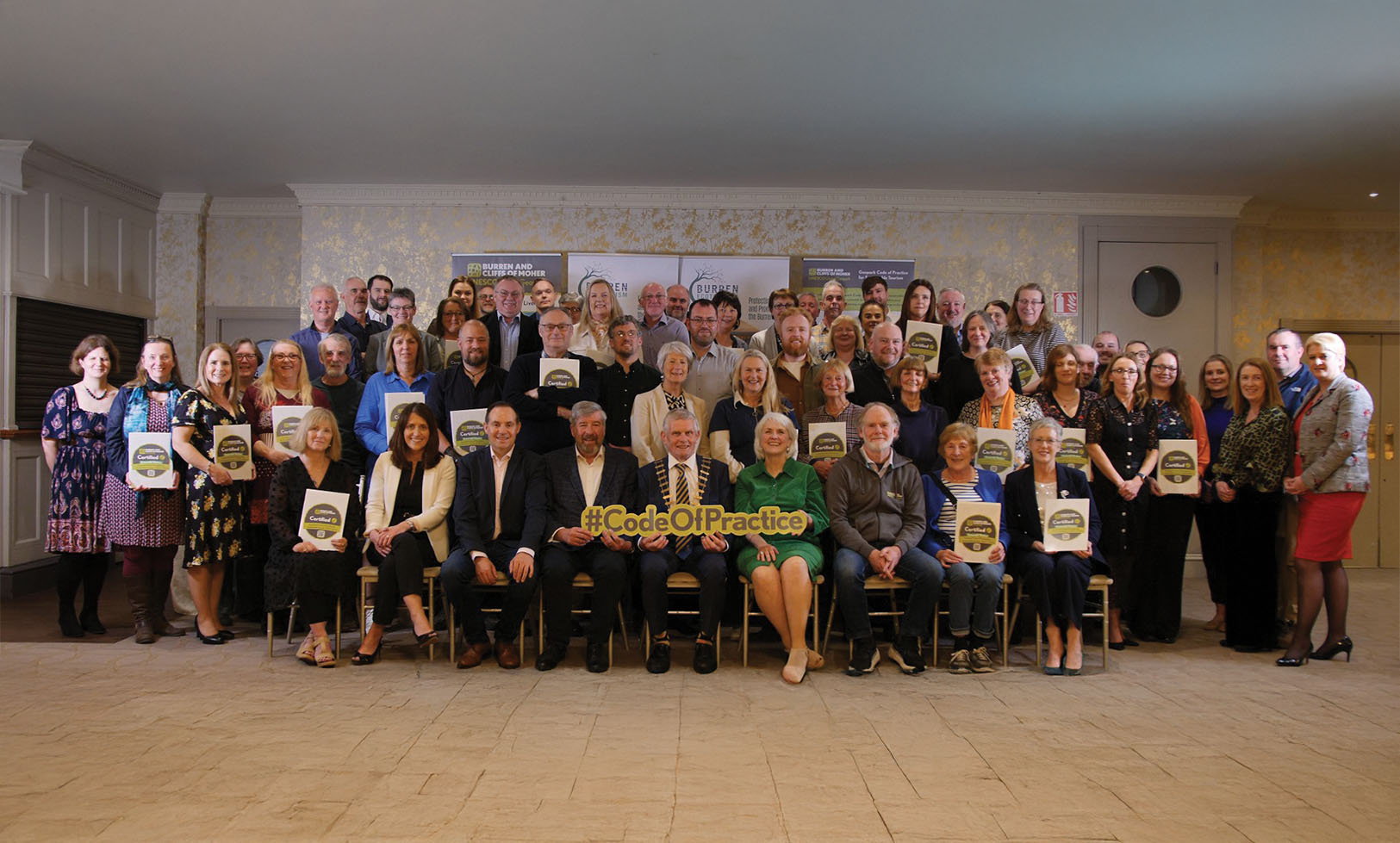Ireland’s first certified sustainable destination

Clare County Council has recently achieved the globally recognised GSTC sustainable destination certification, awarded by leading certifying body EarthCheck.
In 2021, Clare County Council launched a 10-year Clare Tourism Strategy, Guiding our Journey to a Vibrant New Future in Tourism, which was an evidence-based, forward-looking, and innovative approach to tourism planning in Clare and a roadmap for public and private investment over the following decade. Led by the Tourism Department of Clare County Council, this strategy was shaped through extensive stakeholder and public consultation. The strategy is underpinned by a clear and ambitious vision: “Clare is a globally renowned, sustainable, and vibrant destination by 2030.”
In an era of growing sustainability commitments, there is an increasing demand for transparency and integrity from stakeholders across the public sector, industry, residents, and visitors. Tourism is Ireland’s largest indigenous employer, supporting essential livelihoods, especially in rural areas of Ireland such as County Clare. In the face of global uncertainties affecting other sectors such as pharmaceuticals and technology, there is a critical need to sustain and strengthen tourism as a resilient, community-driven pillar of Ireland’s economy.
Recognising the vital role of local authorities in managing destinations and tourism infrastructure, Clare County Council has adopted an initiative-taking leadership approach. Through cross-departmental collaboration and engagement with external stakeholders, the Council has successfully secured Ireland’s first third-party verified sustainable destination certification from EarthCheck, the world’s leading certification body for sustainable tourism.
According to Councillor Shane Talty, Chair of Clare County Council’s Tourism Directorate SPC: “Securing this accreditation is a major achievement at a time when the tourism sector is navigating significant challenges. It is vital that our county continues to lead by example, setting a path that others may follow now and into the future.”

This internationally recognised certification requires destinations to monitor and report on a comprehensive set of environmental, cultural, social, and economic indicators, all subject to independent auditing. The requirement of annual auditing and benchmarking is a core component of the certification process, supporting continuous improvement by identifying strengths, gaps, and opportunities year-on-year, enabling destinations to adapt proactively to emerging challenges and sustainability goals. Clare’s achievement ensures that its tourism practices are informed by the highest global standards, offering a credible and measurable pathway toward sustainability. Furthermore, this certification places Clare County Council in a strong position to comply with the forthcoming EU Green Claims Directive, designed to prevent greenwashing and promote authenticity in environmental communications across the European market.
As part of the certification process, a Sustainable Destination Action Plan is currently being developed to guide the long-term implementation of sustainable tourism practices throughout County Clare. Central to the action plan is resident insights, ensuring that local values, concerns, and aspirations directly inform how actions are shaped and delivered. In collaboration with partners such as the Atlantic Technological University (ATU) and the Atlantic Coast Sustainable Tourism Observatory, a UN Tourism initiative, the certification supports evidence-based decision-making. The certification commitment is demonstrated through a series of key deliverables, including:
- establishment of a county-wide, multi-sectoral Destination Green Team;
- adoption of a Sustainable Destination Policy;
- development of a Sustainable Destination Action Plan;
- destination Risk Assessment;
- implementation of an annual, third-party audit; and
- annual Benchmarking and reports.
Sustainable tourism in action: The role of local authorities
Local authorities play a critical role in the delivery of tourism across Ireland, with responsibilities ranging from infrastructure management to supporting Destination Experience Development Plans (DEDPs). The sustainable certification journey offers local authorities a structured framework to engage meaningfully with residents, visitors, local businesses, and public agencies to advance tourism in a more sustainable way. As local authorities across Ireland are now mandated to develop climate action plans, it is essential that tourism strategies are aligned with broader climate objectives. Clare’s experience in achieving the certification provides a practical and replicable model for other local authorities seeking to integrate tourism with climate resilience and community engagement.
However, to fully realise this ambition at a national scale, dedicated funding within research mechanisms is essential. Such investment represents strong value for money, particularly when the outcome is a tourism sector that is more resilient, aligned with climate action goals and supports sustainable development strategies.
As James Hanrahan of Atlantic Technological University (ATU) notes: “Securing dedicated research funding is essential for sustainable tourism development. The Planning and Development Act 2024 plays a pivotal role in enabling forward-looking infrastructure planning and it is vital that we integrate planning processes with robust research to ensure evidence-informed decision-making. Tourism, by its nature, experiences its ‘up days’ and ‘down days’, which makes having specialist, evidence-based expertise all the more critical. While local authorities may not always receive the recognition they deserve, their role within democratic governance is essential. Through elected representatives and structured planning frameworks, they are uniquely positioned to support long-term sustainability goals. Fundamentally, local authorities play a central role in realising the principle -that a good place to live is a good place to visit.”
County Clare’s Destination Green team
As part of Clare’s journey toward certification, County Clare has established Ireland’s first Destination Green Team, chaired by Deirdre O’Shea, Head of Tourism, Clare County Council. In addition, Clare County Council has resourced a full-time Sustainable Destination Development Officer, Fiona McKenna, who has led all background research and data collection. The team is dedicated to the implementation of the certification process. As McKenna notes: “One of the valuable outcomes of pursuing sustainability certification is the formation of the Destination Green Team and the ability to benchmark, and action against data as a team.”
Core responsibilities of the team include delivering Clare’s Sustainable Destination Action Plan, aligning relevant policies, and conducting risk assessments. The team brings together around 40 members, representing diverse expertise from Clare County Council’s Environment, Climate Action, Heritage, and Biodiversity departments, alongside strategic partners. This integrated governance model ensures that Clare’s sustainable tourism certification is informed by best practice and is aligned with national and EU policy objectives. Current members of the Clare Green Team include the following representatives, namely:
- Tourism Department, Clare County Council;
- Environment and Climate Action Department, Clare County Council;
- Municipal Districts, Clare County Council;
- Rural and Community Development Department, Clare County Council;
- Heritage, Biodiversity and Planning Department, Clare County Council;
- Burren and Cliffs of Moher UNESCO Global Geopark, Clare County Council;
- Clare Collections, Clare Tourism Development DAC;
- Irish Farmers’ Association;
- North Clare Community Group;
- Burren Ecotourism Network;
- East Clare Tourism Network;
- Loop Head Tourism Network;
- Private tourism businesses;
- Fáilte Ireland;
- National Parks and Wildlife Service (NPWS);
- Office of Public Works;
- Geological Survey of Ireland;
- National Monuments Service;
- Limerick Clare Conference and Sports Bureau;
- Shannon Airport; and
- Atlantic Sustainable .Tourism Observatory, Atlantic Technological University, Sligo, Ireland.
The role of Shannon Airport and Moneypoint Power Station
As part of Clare’s EarthCheck certification process, key infrastructure sites were independently audited. These included Shannon Airport, a vital transport hub, and Moneypoint Power Station, currently undergoing a major transition towards clean energy while continuing to serve as a critical backup for Ireland’s electricity grid.

Shannon Airport
Sustainability is increasingly central to the strategic direction of both County Clare and Shannon Airport. The Shannon Airport Group has formed a Sustainability Team, led by Sinéad Murphy.
The key figures on the Shannon Airport Group’s Sustainability Team are active members of the Clare Green Team- a cross-sectoral working group established to coordinate the EarthCheck certification. Their active involvement reflects a growing recognition of the airport’s role not just in connectivity but also in advancing climate and sustainability standards. During the EarthCheck audit, Shannon Airport demonstrated tangible actions across several aspects including carbon management, waste reduction, energy efficiency, biodiversity regeneration, and stakeholder engagement.
The integration of airport infrastructure within the county’s sustainability agenda highlights the importance of collaborative governance in destination management.
The Shannon Airport proactive engagement is a showcase of the type of public-private partnership needed to transition Ireland’s regions toward more resilient futures. The collaboration between Clare County Council and The Shannon Airport Group through the Clare Green Team and sustainable destination certification, offers a leading example of how aviation, local authorities and community stakeholders can collectively work together through the lens of sustainability.

Moneypoint Power Station
Sustainability is also central to the evolving role of Moneypoint Power Station within County Clare and the national energy landscape, under the leadership of Stephen O’Mahoney. As one of Ireland’s largest energy generation facilities and a large historic employer within Clare, Moneypoint is undergoing a significant transition-from a legacy fossil-fuel plant to a forward-looking clean energy hub.
Critically, it will continue to serve as a strategic backup provider for the national electricity grid. During the EarthCheck audit, Moneypoint Power Station demonstrated a commitment to emission reductions, energy innovation, and stakeholder cooperation. Its presence in the certification process underscores the county’s integrated approach to sustainability, one that does not exclude heavy infrastructure, but instead brings it into the forefront of the process.
By collaborating with Clare County Council within the certification, Moneypoint is helping to redefine what sustainability looks like for complex legacy energy infrastructure in a rural context. This alignment between energy transition and destination sustainability planning within certification positions Clare as a national example of forming strategic partners across climate, national security, and economic development.
Businesses’ role in sustainable destinations
County Clare’s approach to sustainable destination management draws on historical, proven models of business and cross-sectoral collaboration. Established in 2019, the Burren and Cliffs of Moher UNESCO Geopark Code of Practice for Sustainable Tourism is adopted by approximately sixty businesses within the Burren Ecotourism Network.
The Code of Practice has been recognised as a best-practice in sustainability, requiring businesses to measure, monitor, and action against energy and water use, waste generation, use of local products and services, contribution to communities, protecting biodiversity and promoting culture.
As Carol Gleeson, manager of the UNESCO Global Geopark explains: “The Code is evidence-based, and third-party evaluated. When visitors choose businesses that have completed the Code, they are choosing businesses who demonstrate that they are actively protecting their landscape, investing in local economies, and are passionate about working together towards a better future for their communities.”
Clare County Council has demonstrated increased commitment to expanding the Code of Practice across more tourism networks within the county. This reflects the recognition that local businesses play a crucial role in transitioning destinations to become more sustainable by aligning with recognised sustainability standards. Tourism enterprises that complete the Code of Practice not only reduce their environmental impact, but also enhance the visitor experience and strengthen the destination’s reputation. Their collective efforts are vital in meeting the sustainability indicators required for international sustainable destination certification.

For any more information or queries please contact The Tourism Department of Clare County Council
T: 065 682 1616
E: tourism@clarecoco.ie





